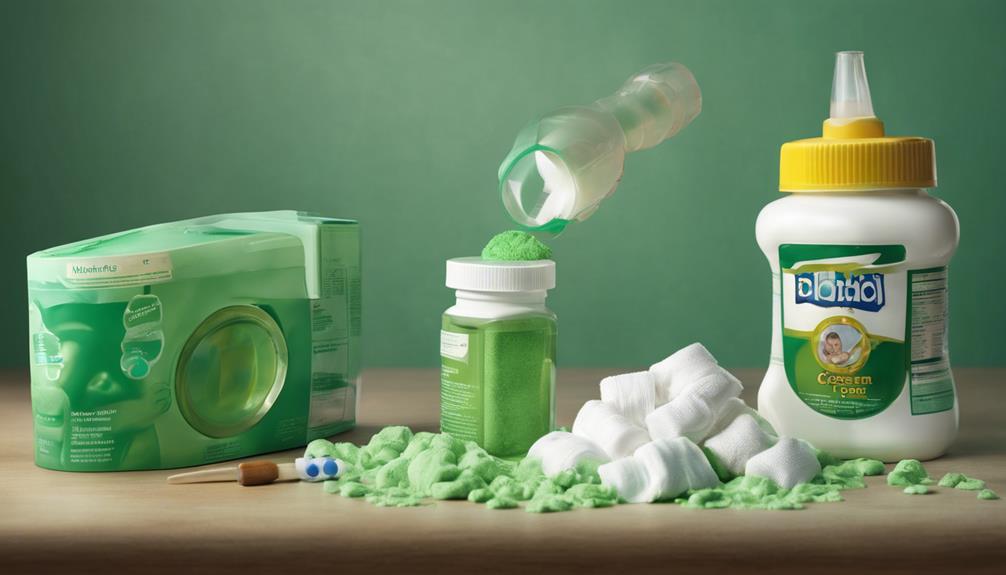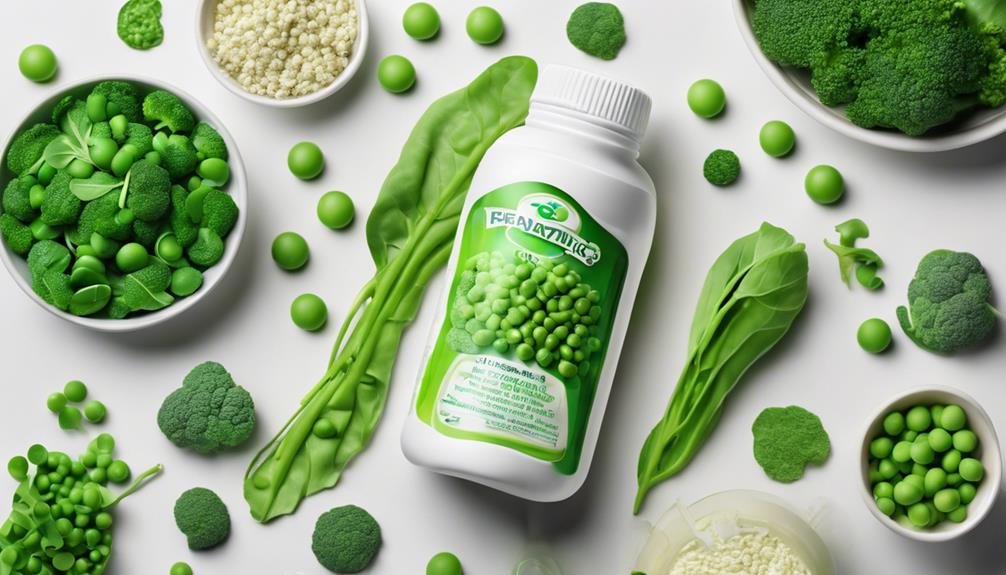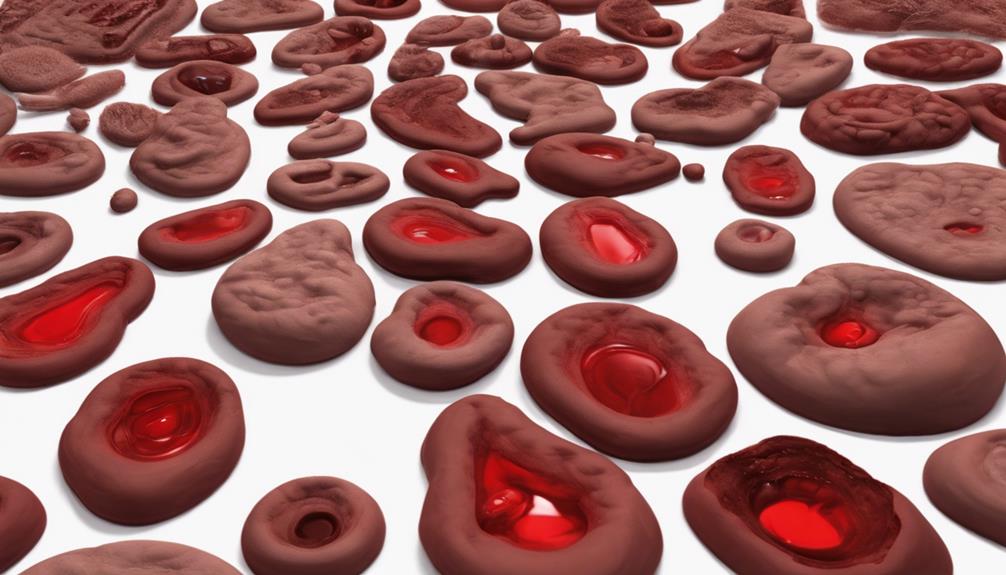Let’s investigate the widely held belief that green stool in formula-fed newborns is only caused by iron content. While iron may play a role in greenish poop, there are other important factors to consider.
Understanding the intricate relationship between a baby's digestive system and the components of formula might shed light on this phenomenon. Stay tuned to uncover the complex interplay that influences a newborn's poop color and how it relates to their well-being.
Key Takeaways
- Iron content in formula can cause green poop in newborns.
- Artificial colors and additives in formula may affect stool color.
- Monitoring stool color and consulting a healthcare provider are crucial.
- Considering a formula switch under a provider's guidance can address green poop concerns.
Common Causes of Green Poop in Newborns
Green poop in newborns can be attributed to various factors related to formula feeding. The iron content in certain formulas can impact stool color, causing it to appear green. Additionally, a foremilk-hindmilk imbalance during bottle feeding may lead to green poop in formula-fed infants. Some additives or ingredients in the formula itself can also contribute to the change in stool color.
When newborns digest formula rapidly, bile pigments may not have adequate time to break down, resulting in green poop. Changes in the newborn's diet, such as switching formula brands, can also play a role in altering stool color. Understanding these common causes of green poop in formula-fed babies can help caregivers assess and address any potential issues with stool color effectively. It's important to monitor the newborn's diet and any changes in formula to determine the root cause of the green poop.
Impact of Formula on Baby's Stool Color

In considering the impact of formula on a baby's stool color, it's important to recognize that various components within infant formula can directly influence the hue of a newborn's poop.
- Iron Content: Iron-fortified formula may lead to a greenish tint in a baby's stool, especially if the baby struggles to digest the iron properly.
- Artificial Colors and Additives: Some formula brands contain artificial colors or additives that can alter stool color, potentially causing green poop in formula-fed babies.
- Normal Variation and Symptoms: Green poop in formula-fed infants is often a normal variation. However, if green stool persists or is accompanied by other concerning symptoms, such as changes in feeding patterns or irritability, seeking advice from a healthcare provider is recommended for further evaluation.
It's crucial to monitor the baby's stool color and overall well-being to optimal health and development.
Understanding Bile Levels in Infants
How do bile levels in infants influence the color of their stool?
Bile, a greenish-yellow fluid produced during the breakdown of bilirubin in the liver, plays a critical role in digestion.
In formula-fed babies, higher bile levels can result in greenish poop due to differences in how bile pigments and nutrients are processed during digestion and absorption.
Compared to breastfed infants, formula-fed babies may exhibit greener stool due to variations in bile composition and digestion processes.
The presence of bile pigments in formula milk contributes to the green color observed in the poop of formula-fed newborns.
Understanding the relationship between bile levels and digestion is key to deciphering the green poop phenomenon in formula-fed infants, shedding light on the interplay between bile, nutrients, and stool color in newborns.
The liver's production of bile and its impact on digestion highlight the intricate processes influencing stool color in infants.
Dietary Factors Influencing Stool Color

Understanding the dietary factors that influence the color of a newborn's stool can provide valuable insights into potential causes of green poop in formula-fed infants. When considering dietary factors that may impact stool color in formula-fed babies, several key points should be taken into account:
- Iron-fortified formulas: Iron-fortified formulas are known to sometimes cause green poop in newborns due to the presence of iron, which can affect stool color.
- Artificial dyes and additives: The inclusion of artificial dyes or additives in formula can lead to greenish hues in a newborn's stool, altering its color.
- Sensitivity or intolerance: In some instances, formula-fed babies may develop green poop as a result of sensitivity or intolerance to specific ingredients present in the formula.
It is essential to be mindful of these factors when observing changes in stool color in formula-fed infants. If parents notice persistent green poop or have concerns about their baby's stool color, consulting a pediatrician can help identify the specific dietary factors contributing to this occurrence.
Addressing Green Poop Concerns in Babies
When addressing concerns related to green poop in babies who are formula-fed, evaluating the composition of the formula is important to pinpoint potential causes. Formula-fed babies with green poop may struggle with digesting the iron content in their formula, leading to stool color changes. Green poop in infants on formula is typically not worrisome unless accompanied by other symptoms. Consulting a healthcare provider can help determine if adjustments in the formula composition are needed. This may involve switching to a different formula type or brand to alleviate the symptoms. Below is a table summarizing key points when addressing green poop concerns in formula-fed babies:
| Key Steps | Description |
|---|---|
| Evaluate Formula | Assess the iron content and other components in the formula to identify potential triggers. |
| Monitor Symptoms | Keep track of any additional symptoms accompanying green poop for a thorough evaluation. |
| Consult Healthcare Provider | Seek guidance from a healthcare professional to determine the best course of action. |
| Consider Formula Switch | Changing to a different formula may help alleviate green poop and associated issues. |
| Follow Provider's Advice | Adhere to recommendations provided by the healthcare provider for proper management. |
Frequently Asked Questions
Is Green Poop Normal for Formula-Fed Newborns?
Green poop in formula-fed newborns can be normal due to iron content. It can cause stool color changes, often greenish hues. Differences in digestion between formula and breastfed babies can result in darker or greener stools.
How Do I Stop My Formula-Fed Baby From Having Green Runny Poop?
We can stop green runny poop in formula-fed babies by switching formula types, ensuring thorough mixing, and watching for intolerance signs. Always consult the pediatrician first for guidance on addressing green poop concerns effectively and safely.
Does Enfamil Cause Green Poop?
Enfamil can contribute to green poop in newborns due to its iron content. The way the body processes this iron can lead to stool color changes. Consult a healthcare provider if concerned about accompanying symptoms.
Why Is My Breast Milk Fed Babies Poop Green?
Digestion speed influences the hue of breastfed babies' poop. Swift processing of breast milk leads to more green bile pigments present. Adjusting feeding patterns or maternal diet often resolves the issue as green poop is typically harmless.
Conclusion
To sum up, green poop in newborns on formula can be caused by various factors such as dietary influences and imbalances in milk intake. Understanding the impact of formula on bile levels and considering dietary factors can help address concerns about stool color in babies.
But, do we really need to worry about green poop in newborns, or is it just a normal part of their development?









